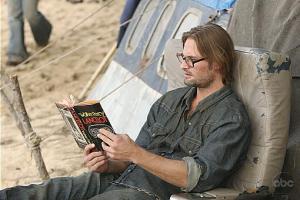It's been a bad-tempered campaign, often peevish and at times verging on the distinctly shirty.
So to get away from this parliament of crows and the not unfrenzied activity which has surrounded it, I decided to catch up with my reading. Our town library now boasts a vast(ish) English language section with a high proportion of crime/mystery novels. From Block, Connelly, Coben and Cornwell all the way to Westlake. Wodehouse is also there to ease the fractious mind.
My selection this last month has largely consisted of books I should have read long ago, but have inexplicably failed to. So it's been Catch-Up time. But you can't ever really catch-up, can you? And my reading has been interfered with by the thought that people will say incredulously "You haven't read that? But everybody's read that. Years ago!"
Well, okay. We can't all be perfect and I don't get out much. But three of this month's books have made for a fine distraction from the worritsome Gallic punch-up. What I like in a book is (of course) a good story well told, but I also love to learn about something new to me. And these three have all taught me something new, told me about something of which I was completely ignorant. Coincidentally, all three concern America, but I don't mind that.
The first is The Given Day by Dennis Lehane. This is a very good book indeed. I've now stopped classing D. Lehane as a great crime writer and started thinking of him as a great writer full stop. And what fascinated me was the back-drop of Boston in 1919. I had never heard of the Boston police strike and most of all, I had never heard of the Boston Molasses Disaster. If anyone had spoken to me about it before I came across the book, I would have assumed they were talking about a Monty Python sketch. But the horrid reality was anything but funny. And the fact that it has Babe Ruth as a sort of Greek Chorus turning up throughout the narrative is a clever added bonus.
My second selection is The Interpretation of Murder by Jed Rubenfeld. I am always a little wary about detective novels written about actual historical figures, but this is an exception. I didn't know about Sigmund Freud's visit to New York in 1909, and his fractious relationship with Carl Jung, so here again I learned something new. The (fictional) murder plot which takes place during the visit and with which Freud becomes involved is well constructed but again, it was the back-drop that entertained me the most. The New York of 1909, with its towering nineteen-floor (gasp) skyscrapers, the Manhatten Bridge as yet unbuilt, the social New York of the Four Hundred Families - all beautifully drawn.
Third and not least, I read this.
After 'No Country For Old Men', I had to amend my List Of People To Be Really, Really Scared Of, to include Anton Chigurh, but nothing prepared me for this. Why on earth hadn't I read this before? It is one of the strangest, most terrible, most terrifying things I have ever read. I kept having to stop during one of McCarthy's long hair-raising paragraphs, to take a few deep breaths and tell myself it was only a book. But it isn't only a book. One review (the NYT, I think) called it a journey 'through a hell without purpose'. And that it is and then some. There is no salvation in this book, no redemption for anyone. The end is as terrible as the beginning. It is dark, bloody and pitiless.
And what I didn't know about was John Joel Glanton , his band of scalphunters and their horrid, bloody work in 1849. And worst of all, I didn't know about Glanton's appalling second-in-command, the dreadful Judge Holden. And now I know, I'm not sure I wasn't better off not.
What mesmerises is McCarthy's English which is like no English language anyone one has written or read before. It isn't simply the repetitive use of 'and', nor the lack of quotes around the dialogue. It is the way he drifts into near-Biblical or quasi-mediaeval mode, his use of the archaic word, the outmoded phrase when he is describing the indescriptible which raised the hair on my neck. I am going to have to read it again to make sure I had it right the first time. But not just yet. I have to read some P.G.Wodehouse to settle my nerves.
France has elected a new President.
And I have elected Judge Holden to head my List of People To Be Really Really Scared Of, which now reads:
1. Judge Holden
2. Anton Chigurh
3. Roy Batty
4 Keyser Sose
They just keep on coming.





